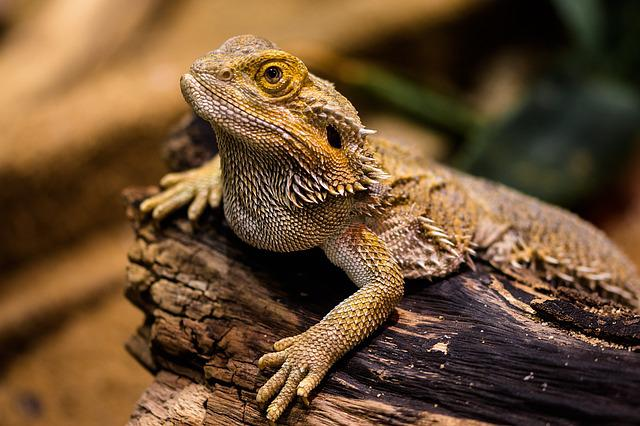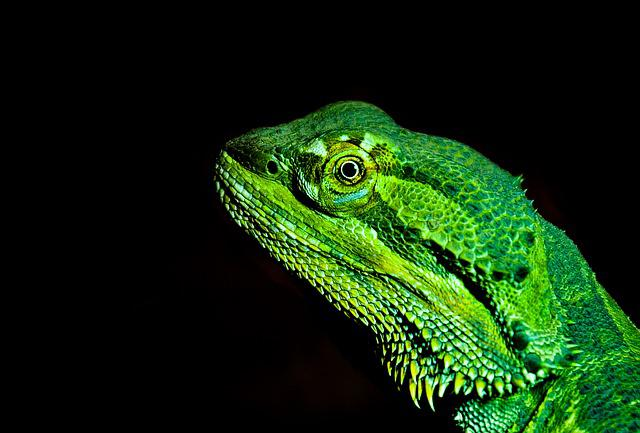Why is my bearded dragon breathing heavy? If you’ve just noticed that your bearded dragon is breathing heavily, there’s no need to panic. It’s normal for them to pant after exercise, or when they’re feeling hot. However, if your beardie is constantly panting and doesn’t seem to be taking a break, it might be time to see a vet. In this article, we’ll discuss the possible causes of heavy breathing in bearded dragons, as well as how you can help ease their discomfort.

Reasons Why My Bearded Dragon Breathe Heavily?
If you notice your bearded dragon is breathing heavier than normal there could be a few reasons why. It’s important to take note of other symptoms and possible stresses that might be affecting your dragon.
- Bearded dragons are reptilian creatures and as such are cold-blooded. This means that they rely on their environment to maintain their body temperature. If your house is particularly cold, this can cause your dragon to breathe heavier in an attempt to warm itself up. In the wild, bearded dragons will bask in the sun to regulate their body temperature. If you think your home might be too cold, try using a reptile basking light to create a warm spot for your pet. You should also check the temperature of the basking area to make sure it is not too hot.
- When your Bearded Dragon is basking in their heat lamp and warming up their body temperature, they will start to breathe heavier. You’ll see their sides start to move in and out as they take deep breaths. This is perfectly normal and is nothing to worry about. Their bodies are just trying to regulate their temperature and get back to their preferred temperature range. However, if you consider your bearded dragon to be breathing heavy, it could be a sign that something is wrong. They may be too hot or too cold, stressed, or sick.
- Heavy breathing can also be a sign of stress. Bearded dragons are naturally shy creatures, and they can get easily stressed in new environments or around new
- While it’s true that bearded dragons come from hot, arid environments, they still need a warm, humid environment to thrive. If their cage is too dry, they can develop respiratory infections. When they are trying to breathe, you may notice your bearded dragon’s chest and sides moving in and out rapidly with mouth open. Why is my bearded dragon breathing heavy and opening mouth? This behavior, called gaping, shows that the lizard is at its optimal temperature for basking. Another possible reason for heavy breathing is respiratory infections. Infections of the lungs and airways are common in captive reptiles and can be caused by several different bacteria or viruses. Respiratory infections are a common health problem in bearded dragons. Bearded dragons are prone to respiratory infections because of their anatomy. They have long, thin bodies and small lungs, which make it difficult for them to get enough oxygen. Bearded dragons also have a “third eyelid,” which can trap bacteria and other particles. These factors make bearded dragons more susceptible to respiratory infections than other reptiles. The most common symptom of a respiratory infection is increased respiration rate. Bearded dragons may also breathe with their mouth open, or “gape,” and have difficulty moving their legs. If you think your bearded dragon might have an infection, it’s important to take them to see a reptile vet as soon as possible. Treatment will likely involve antibiotics or other medications.
Other symptoms of a bearded dragon respiratory infection include wheezing, bubbling noises when breathing, and black or green mucus coming from the nose or mouth. If left untreated, respiratory infections can be fatal. Therefore, it’s important to be aware of the signs and to seek treatment as soon as possible. In the meantime, you can try increasing the humidity in their enclosure by misting it with water or adding a humidifier. You should also make sure that they have plenty of warm places to bask in their enclosure. By providing your bearded dragon with the proper care, you can help them stay healthy and avoid respiratory problems.
Do Bearded Dragons Breath Heavy While Eating?

One common issue you face owning a bearded dragon is heavy breathing during meals. This is perfectly normal behavior and is nothing to be concerned about. As humans, our body has acids and bacteria which help us digest food. For beardies, heat plays a massive role in the digestive process, rather than the acids that other animals use.
There are a few possible explanations for why this occurs. First, when bearded dragons eat, they tend to gulp their food down quickly. This can cause them to take in more air than usual, leading to heavy breathing. Secondly, the act of chewing and swallowing can also be taxing on their respiratory system. Bearded dragons have relatively small lungs, so they need to work harder to get enough oxygen when they are eating. Lastly, some experts believe that heavy breathing during meals may help bearded dragons to digest their food more efficiently. In any case, there is no need to be alarmed if your bearded dragon’s breath starts heaving when it’s time for dinner. You may also cut the food smaller to help your bearded dragon.
Can The Digestive Process Make A Bearded Dragon Breathe Heavy?
Bearded dragons are awesome pets. They are friendly, low-maintenance, and generally easy to care for. However, there is one aspect of their care that can be a bit confusing: their digestion. Unlike many other reptiles, bearded dragons do not have an efficient digestive system. As a result, they require a special diet and lifestyle to maintain their health. For example, bearded dragons should be fed small meals several times a day rather than one large meal. This helps to prevent indigestion and gastrointestinal problems. In addition, they should be provided with plenty of opportunities to exercise and bask in the sun. These activities help to stimulate their digestive system and promote healthy bowel movements. With a little bit of care, you can help your bearded dragon stay healthy and happy.
Conclusion
There are many potential reasons why your bearded dragon may be slow breathing or breathing heavier than normal. If you notice your pet displaying any other strange behaviors or if their respiratory rate does not return to normal after some time, it is always best to consult with a qualified reptile veterinarian for further evaluation and care.

